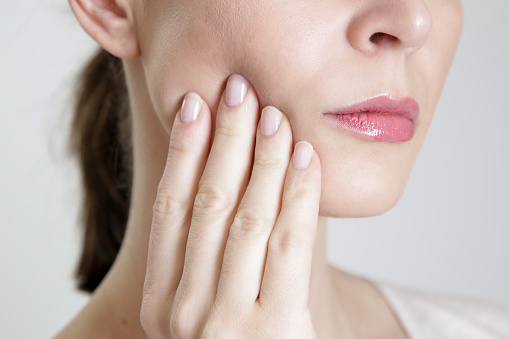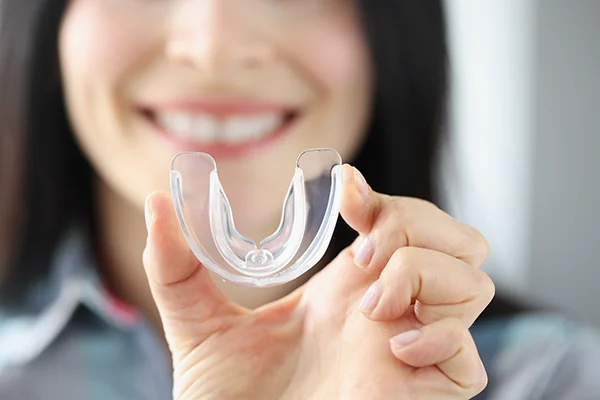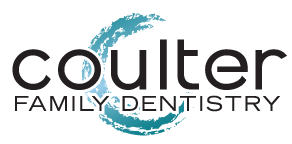Bruxism Spokane Valley WA Bruxism is a condition characterized by grinding or clenching of the teeth. It is often an involuntary response to emotional issues. In some people, it can result from hormonal imbalance or a sleep disorder. Bruxism can lead to oral problems like tooth loss, cracked teeth, and jaw pain, without proper treatment. Bruxism is a condition characterized by grinding or clenching of the teeth. It is often an involuntary response to emotional issues. In some people, it can result from hormonal imbalance or a sleep disorder. Bruxism can lead to oral problems like tooth loss, cracked teeth, and jaw pain, without proper treatment. The condition can escalate and cause temporomandibular joint (TMJ) disorder. As the name suggests, TMJ is a dysfunction of the jawline characterized by tenderness and discomfort in the jaw due to excessive teeth grinding or clenching. Fortunately, bruxism is treatable. Our family dentist at Coulter Family Dentistry can help treat bruxism through medication, physiotherapy, or mouth guards in Spokane. Types of BruxismBruxism can happen when awake or during sleep. Awake bruxism occurs during the day, and it has links to concentration and emotional issues. In most cases, awake bruxism does not require treatment since the patient can realize they are grinding their teeth and stop. Sleep bruxism occurs during sleep. It is more common and tends to cause more harm since most patients are unaware they are grinding their teeth at night. They may only realize the symptoms after developing dental issues. It can also lead to headaches, migraines, and jaw pain. Anyone experiencing teeth grinding issues in Spokane Valley, WA, should consider obtaining quality mouth guards from our family dentistry office at Coulter Family Dentistry. What Causes Bruxism?The primary causes of bruxism remain unknown. However, healthcare experts suggest TMJ bruxism might result from emotional, physical, and genetic issues or a combination of all these factors. Psychological factors can cause bruxism as the body responds to the prevailing emotional changes. In some cases, patients using certain medications might experience temporary bruxism. Teeth grinding can also be hereditary. If a parent has bruxism, their children will more likely grind their teeth. The age factor might also play a role, with children more vulnerable to bruxism than adults. Other factors with links to bruxism include lifestyle habits like smoking and drinking alcohol, sleep disorders, and snoring. TMJ bruxism is often a result of untreated bruxism. It develops from teeth grinding, misaligned teeth, jaw injuries, and osteoarthritis. Signs and Symptoms of BruxismSigns and symptoms of bruxism might be evident or unnoticeable. They depend on whether they occur when the patient is awake or asleep. Whatever the case, common symptoms include dental fractures, jaw pain, headaches, and sleep problems. Other signs include increased tooth sensitivity, chipped enamel, and receded gums. Sometimes, the teeth grinding might be too loud to the extent of waking up your partner or roommate. Diagnosing BruxismBruxism usually requires a medical diagnosis to confirm and determine the severity of the condition. The diagnosis begins with a thorough physical exam. Our dentist will inspect your mouth for enamel erosion, loose teeth, and receded gums. We will also check your bite and teeth alignment to determine if there is a risk of developing bruxism or TMJ. We may ask if you often grind or clench your teeth or whether your family has a history of bruxism.  Treatment Options for BruxismTreatment options for bruxism depend on the cause of the problem and other underlying factors. These include your age and dental health. Primarily, our dentist will fit you with quality mouth guards in Spokane to protect your teeth at night from the force of grinding or clenching. We may have to take a dental imprint of your mouth to design custom mouthguards that you will wear during bedtime.Our specialist may recommend cognitive behavioral therapy for treating bruxism linked to emotional issues. This technique involves learning to rest the tongue, lips, and teeth to reduce discomfort. You may also change your posture and sleep positions to limit the likelihood of teeth grinding. How to Prevent or Reduce BruxismYou can prevent or reduce bruxism through various strategies. The most effective way to limit the condition is to make lifestyle changes. Avoid smoking and limit your alcohol intake, as these substances can escalate the symptoms of bruxism.Embrace relaxation techniques such as meditation, listening to music, or reading a book to reduce emotional problems that can cause bruxism. Exercise regularly, even if it is taking a 20-minute walk or jogging. Also, create an appropriate sleep environment by avoiding distractions during bedtime. Ensure your room is quiet and dark, and relax for a few minutes before sleeping. Most importantly, schedule regular dental checkups with our family dentist at Coulter Family Dentistry for help with teeth grinding in Spokane Valley, WA. Frequently Asked Questions About BruxismNot many people understand bruxism symptoms and causes. Here, we answer the most frequently asked questions about teeth grinding.Is bruxism a sleep disorder?Bruxism is a sleep disorder that starts with the frequent and involuntary grinding or clenching of teeth at night during sleep. However, it can also be a dental problem as some people might unconsciously grind their teeth while awake.Is bruxism hereditary?Bruxism can be hereditary. If a parent has bruxism, their children will likely follow the same path.Can bruxism cause complications?Bruxism does not usually cause severe health complications. However, untreated bruxism might lead to migraines, facial pain, and damaged teeth. It can also cause temporomandibular joint disorder or TMJ.Are TMJ and bruxism the same?TMJ and bruxism are not the same. Untreated bruxism is one of the causes of temporomandibular joint (TMJ) disorder.Can bruxism stop on its own?Bruxism can stop on its own without requiring treatment. Children with bruxism often outgrow the condition when they become teenagers or reach adulthood. Adults with bruxism may have to seek other interventions to handle the condition.Seek Professional Help for Teeth Grinding in Spokane Valley, WAInvesting in quality night guards or mouth splints can protect your teeth from damage and safeguard your oral health. Contact Coulter Family Dentistry at (509) 209-8747 for customized mouth guards in Spokane Valley, WA, and to speak to our family dentist. |
 PhoneHoursMon: 6:30am - 4:00pm Tue - Thu: 6:30am - 3:30pm Friday, Saturday, and Sunday Closed |